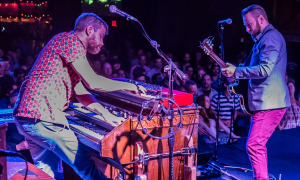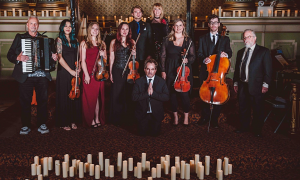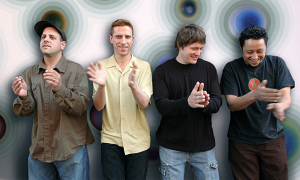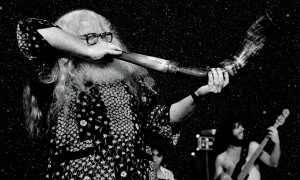Home » Jazz Articles » From the Inside Out » Three of a Perfect Pair
Three of a Perfect Pair
 Jimmy Smith
Jimmy Smith
Plays Fats Waller
Blue Note (RVG Edition)
2008
Fats Waller, whose rollicking contributions have enlivened the American songbook since the 1930s, once wrote, "Well, I really love the organ. I can get so much more color from it than the piano that it really sends me." About a generation later, Jimmy Smith fell in love with the Hammond B-3 organ.
Here in the company of guitarist Quentin Warren and drummer Donald Bailey (both of whom played on every Smith trio recording for five decades), the latter pays tribute to the former. Smith offers very little melodic, harmonic or rhythm improvisation, and seems to place some of Waller's most recognized and playful melodies behind airtight protective glass, museum pieces to be admired but not played with. Smith glides through "Everybody Loves My Baby" and neatly tucks in every edge and corner of "Squeeze Me"—too neatly, almost clinically.
Smith recites "Ain't She Sweet" using chord swells and inflections that only the Hammond B-3 can produce and adorns "Lulu's Back in Town" in slightly new, slightly blue threads before setting her off on a finger-snapping melodic stroll. Sections of "Honeysuckle Rose" intimate jazz and blues, but no more than that; in "Rose," and "Ain't Misbehavin,'" Smith swirls around rippling phrases to create sparkling, liquid pools of melody.
But the beat and tempo remain almost constant throughout, and for the most part it seems fairly obvious that Smith sets his engine running, tunes it a bit then coasts downhill through every tune. What seems much less obvious is how Jimmy Smith Plays Fats Waller could bring together two of the most flamboyant if not wild characters in the history of jazz organ, yet still result in music so boring and uninspired.
 Lafayette Gilchrist
Lafayette Gilchrist
3
HYENA
2007
3 is pianist LaFayette Gilchrist's third album and his first trio release. He composed, arranged and throws every throbbing note down in the company of his Baltimore homeboys "Blue" Jenkins on bass and Nate Reynolds on drums. "The sound I was hearing in my head is coming from when I first heard Money Jungle," Gilchrist explains. "It's a trio record with Duke Ellington, Charles Mingus and Max Roach. To me, it sounds like an orchestra being played by a trio. I was inspired to make something that sounded big and grandiose just like that."
Mission accomplished. Gilchrist and crew, especially drummer Reynolds, who once pounded beats for soul legend "Wicked" Wilson Pickett, rock this music hard. Jenkins and Reynolds often play so hard and fast in counterpoint to Gilchrist's strong attack that their rhythms become runaway locomotives and you're often left to wonder how the pianist can keep pace. Somewhat amazingly, Gilchrist does, and resurrects in the process structuralist ghosts like Art Tatum and Cecil Taylor (in "Volcano Red"), even Thelonious Monk ("The Equizinator's Request").
Gilchrist cryptically yet insightfully annotates each song title, so you can read his description of "In Depth" as "The pride of James Brown and the depth of inquiry of Andrew Hill," and of "Volcano Red" as "It's the way I like my band to play, like a pot boiling over."
Gilchrist's rhythm section adds so much power and counterpoint to his playing that 3 often sounds like no other piano trio record. In the spry "Inside Outside," Gilchrist seems barely tethered to the rhythm section, and he gnaws on the introductory flurries of "Visitors" like a starving dog until the rhythm pumps up in volume and tempo, whipping his hands to play faster and faster.
"The Equizinator's Request" majestically rocks and just keeps rolling, careening and plummeting as if trapped in rapids, full of an exciting sense of the unexpected, and of rollicking and funky fun.
 Bombay Dub Orchestra
Bombay Dub Orchestra
3 Cities
Six Degrees
2008
In the 1950s, some of the first waves of a "third stream" in music flowed through the works of Gunther Schuller, John Lewis and others working to harmonize the traditions of American classical (jazz) and European classical music. Thanks to communication technology, the world has grown both bigger and smaller in the decades since passed. Today, visionary musicians such as the Bombay Dub Orchestra work to synthesize a new "third stream" that brings together the historic, modern and popular music traditions of Western and Eastern cultures to chart their own new path toward a profoundly global musical village.
3 Cities was primarily recorded with vocalists and classical and street musicians in Chennai and Mumbai (India), then assembled and produced by Garry Hughes and Andrew T. Mackay in London. It is simultaneously ancient and spiritual, and hip-hop stylish and sleek. "Journey" snapshots in brilliant colors the terrain of this third path. It's built upon two Indian ragas intersected by an acoustic jazz piano interlude, all enrobed in twirling flutes and strings like thick dark chocolate, with final steps that seem to have no measured rhythm and essentially float in space time. "Journey" leaves you with the breathtaking view of "Strange Constellations," a sadly beautiful lesson in how electronic or synthetic music can still feel emotionally expressive.
"Map of Dusk" sways upon a softly blue guitar hook that would not sound out of place on a typical smooth jazz "groove" playlist. But Cities does more than contemplate modern life—it reflects in chrome and steel its often harrowing pace. Twisting within the twin spines of North Indian vocals and South Indian percussion, "Spiral" whips through its landscape like a tornado, even pouring out a volcanic duel between the drums and Kartik's vocal. "Monsoon Malabar" sounds nearly indescribable: the production masterfully stretches out one single vocal syllable, "ripples" it into repeated beats, then folds those beats into the rhythm track. The rhythm track keeps propelling the futuristic beat forward even as it keeps tugging backward into traditional Indian melodies and sounds. Here and almost every other place, 3 Cities proves to be an amazing travelogue, and amazing music.
 The Peter Scharli Trio Featuring Ithamara Koorax
The Peter Scharli Trio Featuring Ithamara Koorax
Obrigado Dom Um Romao
TCB Records
2008
Obrigado is both a happy and sad accident. Percussion master Dom Um Romao was friends and played extensively with both Peter Scharli, one of Europe's most inventive composers and trumpeters, and Brazilian vocal powerhouse Ithamara Koorax. Romao introduced the other two, and the three began planning a performance tour together. Sadly, Romao died while these tour plans were still being made ("Manha De Carnival" is arranged around one of Romao's final recordings, on berimbau), so Scharli and Koorax recorded this tribute to their fallen companion instead.
Their renditions of the Brazilian folk song "Prenda Minha (Song #2)" and "Aos Pes da Cruz" were inspired by ones recorded by another trumpeter, Miles Davis, for his Gil Evans Quiet Nights sessions. Koorax shades her vocal in both tunes with brassy overtones that track so closely with Scharli's trumpet that it's extraordinarily difficult to distinguish between their two instruments. The more angular, be-boppish melody of "Two and One" incisively cuts then digs into its groove.
Scharli and Koorax also create an odd but eventually charming version of Cole Porter's "Love For Sale" by stretching out the first half of each verse over twice the number of bars, so that each second half seems to elastically "snap back" into standard time, while Scharli's trumpet solo yearns toward the soft romantic standard set for this tune by Chet Baker.
When her primary instrumental partner is a horn, does Koorax sing differently than she would if she was accompanied by, for example, piano? "I felt, more than ever, like a horn during the Obrigado sessions," she exclusively explained to AAJ. "Sometimes I really feel that there are two horns on the album, me and Peter's trumpet. In some tracks, like 'Estate' and 'Aos Pes da Cruz,' I tried to caress the tune like a flugelhorn player would do; on 'Aos Pes' and 'Song #2 / Prenda Minha,' I reproduced or quoted some of Miles' phrasing on Gil Evans' scores. I was very influenced not only by singers but also by trumpeters like Lew Soloff (in my teens I loved his work with Blood Sweat & Tears), Miles, Freddie Hubbard and, of course, Chet Baker. Trumpet is my favorite instrument! Not to mention that we decided to pay tribute to a drummer/percussionist without using drums or percussion!"
Koorax and Scharli proved to be sympathetic long even before this project. In 2004, each recorded "I Fall in Love Too Easily" without knowing about the other's version, and their new joint recording is the pinnacle of Obrigado. Koorax treasures each word as if it clutches her faith in romance, while Scharli's trumpet gracefully dances within the rhythms of guitarist Markus Stadler and double-bassist Thomas Durst. Koorax closes with a higher-than-high note that no words, no matter how well-written, could make you believe. Listen, and trust your own ears instead.
"The recording of 'I Fall in Love Too Easily' for the Autumn in NY CD (EMI-JSR, 2005) was a very spontaneous first-take, like most of the tracks on that album, which was recorded 'live in the studio'—I mean, I sang together with the musicians," Ithamara explained. "Since then, I've been performing the song in live concerts very often. Peter had also recorded the song in another album before, 'cause it's one of his favorite ballads too. Then we decided to record it again, mixing elements from both of our live performances. The entire Obrigado album was cut live in the studio, so this second version is closer to how I use to sing it in the concerts, including that high note near the very ending."
 Art Farmer
Art Farmer
Brass Shout / The Aztec Suite
Blue Note (Connoisseur Series)
2008
Brass / Aztec combines two releases from trumpeter/flugelhornist Art Farmer: Brass Shout, arranged by his longtime associate Benny Golson, and The Aztec Suite, including its famous panoramic title track, arranged by Chico O'Farrill. Combining these two titles, both from 1959, creates an expansive survey of jazz, Latin jazz and pop played as jazz.
Swaddled and swaying within their brass construction, Golson's Latin / jazz rearrangements of "Autumn Leaves" and "April in Paris" welcome you to this rhythmic dance; Golson's tune "Five Spot After Dark" cuts a sharper groove, the sound of Saturday evening jumping into Saturday night. Composer Bobby Timmons sits in on "Moanin,'" the only tune with piano on either set, and spins a web of soulful funk that sounds very much like Horace Silver, another jazz pianist fond of that "Spanish tinge" (and who composed the opening "Nica's Dream").
This set's obvious showpiece, O'Farrill's epic "Aztec Suite" unfurls with all the color and drama of Gone with the Wind. Each soloist steps out from, then back into the roaring ensemble, which continually moves forward into the next passage, which showcases the next soloist, and so on. Every soloist plays brilliantly, the ensemble roars majestically, and neither overpowers the other. A genuine masterpiece of ensemble Latin jazz, "Aztec" is most likely the closest that O'Farrill ever came to matching the reach and scope of Duke Ellington's suites.
Although it's been historically overshadowed by "Aztec Suite," this version of "Heat Wave" might be even better—with Farmer and his percussionists playing so furiously that they sound intent on blowing each note completely off their sheet music—because it burns just as hot but consumes less than half the time. "Woody N'You" (Dizzy Gillespie) extends the torrid Afro-Cuban groove and explosive ensemble horns, one more stellar example from a set that's thoroughly vibrant, compelling and bursting with energy.
 Danilo Perez
Danilo Perez
Across the Crystal Sea
Decca
2008
At its most basic, Crystal Sea features pianist Danilo Perez leading a quartet with bassist Christian McBride and drummer Lewis Nash, supported by percussionist Luis Quintero. Cassandra Wilson radiates vocals through two standards, "Lazy Afternoon" and "(All of a Sudden) My Heart Sings." Beyond these two standards, Claus Ogerman, who arranged and conducted the orchestra, contributes the melancholic closer ("Another Autumn") plus, according to his arranger's notes, five other pieces "based on classical themes I've known all my life and have always wanted to adapt and record" by Sibelius, Rachmaninoff, Massenet, Manuel de Falla and Hugo Distler.
But you almost never hear Crystal Sea at its most basic. As a consequence, it offers little jazz piano. Perez's quartet is the primary color, but only one color in Ogerman's expansive orchestral palette. Perez sits out long passages in several tunes, and is almost conspicuously absent while Wilson sings. As a result, Crystal Sea sounds more like an Ogerman orchestral album with piano than it does a Perez piano album with orchestra.
Each song captures moments of precious beauty. But most also lack that fire—or whatever is that something, that passion—with which most great music burns. For example, Ogerman moves "Lazy Afternoon" so lugubriously that the rhythmic stillness begins to feel as stifling and oppressive as 100 degrees in the shade heat.
The best moments on Crystal Sea create Jobim-like tapestries woven soft and whole into Afro-Cuban, pop, jazz and classical cloth. Perez first flies through "The Purple Condor," his piano twinkling like a little Latin leprechaun, then digs into more serious chords at both ends of his piano. In "The Saga of Rita Joe," percussion gets washed away by strings that swirl and tower like a tornado to set the pianist's dramatic opening piano scene. Like Ogerman's complementary arrangement, Perez's piano sounds dark and mysterious, yet somehow floats lightly through this "Saga's" many movements.
"When it came to working with Claus, it was another kind of adventure where I was called upon to touch the lyrical side of my playing," Perez explains. "Claus is a master of colors. As the musical director, he provided me with both a story and a landscape, and then told me, 'I want you to paint.'" But it's hard to determine if they painted their Crystal Sea in watercolor, or in watered-down color.
Tracks and Personnel
Plays Fats Waller
Tracks: Everybody Loves My Baby; Squeeze Me; Ain't She Sweet; Ain't Misbehavin'; Lulu's Back in Town; Honeysuckle Rose; I've Found A New Baby.
Personnel: Jimmy Smith: organ; Quentin Warren: guitar; Donald Bailey: drums.
3
Tracks: Visitors; In Depth; Spheres of Existence; The Last Train; Volcano Red; The Enquizator's Request; Inside Outside.
Personnel: Lafayette Gilchrist: piano; Anthony "Blue" Jenkins: bass; Nate Reynolds: drums.
3 Cities
Tracks: Egypt by Air; Journey; Strange Constellations; Junoon; Spiral; Map of Dusk; Fallen; Greenish Blue; Monsoon Malabar; Feasting with Panthers; Amina.
Personnel: Ashwin Srinivasan: bansuri; Sunil Das: sitar; Ulhas Bapat: santoor; Tapas Roy: oud, rebab, saz, santoor; Zarine Sharma: sarod; Dilshad Khan: sarangi; Pradeep Pandit: vocals; Hamsika Iyer: vocals; Rakesh Pandit: vocals; Nishadh Chandra: percussion; Deepak Bhatt: dhol; Madhu Suthnan: percussion; Jaya Chandran: percussion; Saroja: dilruba, tarshenai; Napoleon: bansuri; Sirishkumar: percussion, tablas; Abdullah Mufa: percussion; Will Brown: drums; Abdullah Mufa: drums; Meneka: vocals; Kartik: vocals; David Rainger: guitar; Adam Lamprell: Russian zither; Jonathan Mayer: sitar; Garry Hughes: keyboards, programming; Andrew T. Mackay: piano, bass, programming; Neville Franco: violin, orchestra leader; Shyam Jawda: violin; Chander Makwana: violin; Kamal Pradhan: violin; Errol: violin; Puran Singh: violin; Earnest: violin; Buddhev: violin; Suresh Lalwani: violin; Jitu Thakur: violin; Sanjeev Rao: violin; Suresh Tamayaiya: violin; Nandkishore: viola; Rizwan Sheikh: viola; Evrol D'Souza: viola; Prabhat Kishore: viola; Mark: viola; Dharmendra Jawda: viola; Jeetendra Jawda: viola; Sandeep Thakur: viola; Shyam Jawda: viola; Benny D'Souza; cello; Sanjiv Chakraborty: cello; Lavine: contra bass; Balachandran: violin; Hemanth Raj Muliyil: violin; K Sasikumar: violin; P J Sebastion: violin; P S Ramachandran: violin; Fernandes: violin; R K Prabhakar: violin; Kalyan: violin; Sheik Imam Saheb: viola; Mohan: viola; Cyril Petter Fernandes: viola; K Murali: viola; Jayachandar: viola; R Joseph: viola; Gopnath Sett: viola; P Selvaraj: viola; V R Sekar: cello; R K Vijayendaran: cello; Francis: cello; Srinu: cello; Biddu: contra bass.
Obrigado Dom Um Romao
Tracks: Estate; Love for Sale; Aos Pes Da Cruz; Recado Bossa Nova; Vocalise; Miniature IV; Manha De Carnaval; I Fall in Love Too Easily; Two And One; Prenda Minha.
Personnel: Ithamara Koorax: vocal; Peter Scharli: trumpet; Markus Stadler: guitar; Thomas Durst: double bass; Dom Um Romao: berimbao (7).
Brass Shout / The Aztec Suite
Tracks: Nica's Dream; Autumn Leaves; Moanin'; April in Paris; Five Spot After Dark; Stella by Starlight; Minor Vamp; The Aztec Suite; Heat Wave; Delirio; Woody 'N' You; Drume Negrita; Alone Together.
Personnel: Art Farmer: trumpet; Benny Golson: arranger; Chico O'Farrill: arranger; Lee Morgan: trumpet; Ernie Royal: trumpet; Bernie Glow: trumpet; Markie Markowitz: trumpet; Nick Travis: trumpet; Joe Ferrante: trumpet; Curtis Fuller: trombone; Jimmy Cleveland: trombone; Wayne Andre: trombone; Frank Rehak: trombone; Tommy Mitchell: trombone; James Haughton: baritone horn; Julius Watkins: French horn; Bob Northern: French horn; Jimmy Buffington: French horn; Tony Miranda: French horn; Don Butterfield: tuba; Jay McAllister: tuba; Spencer Sinatra: tenor sax; Zoot Sims: tenor sax; Sheldon Powell: tenor sax; Sol Schlinger: baritone sax; Bobby Timmons: piano; Hank Jones: piano; Percy Heath: bass; Addison Farmer: bass; Philly Joe Jones: drums; Elvin Jones: drums; Charlie Persip: drums; Jose Mangual: Latin percussion; Tommy Lopez: Latin percussion; Willie Rodriguez: Latin percussion.
Across the Crystal Sea
Tracks: Across the Crystal Sea; Rays and Shadows; Lazy Afternoon; The Purple Condor; If I Forget You; (All of a Sudden) My Heart Sings; The Saga of Rita Joe; Another Autumn.
Personnel: Danilo Perez: piano; Cassandra Wilson: vocals; Christian McBride: bass; Lewis Nash: drums; Luis Quintero: percussion; Bruce Dukov: concert master; Claus Ogerman: orchestral arrangements and conductor.
< Previous
West Of State Street / East Of Harlem
Next >
Third Occasion
Comments
Tags
For the Love of Jazz
 All About Jazz has been a pillar of jazz since 1995, championing it as an art form and, more importantly, supporting the musicians who create it. Our enduring commitment has made "AAJ" one of the most culturally important websites of its kind, read by hundreds of thousands of fans, musicians and industry figures every month.
All About Jazz has been a pillar of jazz since 1995, championing it as an art form and, more importantly, supporting the musicians who create it. Our enduring commitment has made "AAJ" one of the most culturally important websites of its kind, read by hundreds of thousands of fans, musicians and industry figures every month.






















